Abstract
To examine the hypothesis that colorectal carcinomas with and without TP53 mutations may be characterised by aetiological heterogeneity, we analysed a group of 107 patients with primary Dukes' C colorectal cancer seen at the Memorial Sloan-Kettering Cancer Center (MSKCC) from 1986 to 1990. We assessed p53 overexpression using the monoclonal antibody PAb 1801, and identified 42 (39%) patients displaying p53-positive phenotype, defined as > or = 25% of positive cells. Patients with two or more first-degree relatives with cancer had an odds ratio (OR) of 2.9 (95% CI 1.0-8.3) for p53 overexpression in comparison with those without a family history of cancer (trend test, P = 0.11). A possible association between body weight and p53 overexpression was observed. The ORs were 1.9 for the second quartile, 1.9 for the third quartile and 3.4 for the highest quartile in comparison with the lowest quartile (trend test, P = 0.06). No association between occupational physical activity, smoking, drinking, parity and p53 overexpression was identified. The results suggest that p53 overexpression may be related to genetic predisposition to colorectal cancer, and p53-positive and p53-negative colorectal cancers may be controlled by different aetiological pathways.
Full text
PDF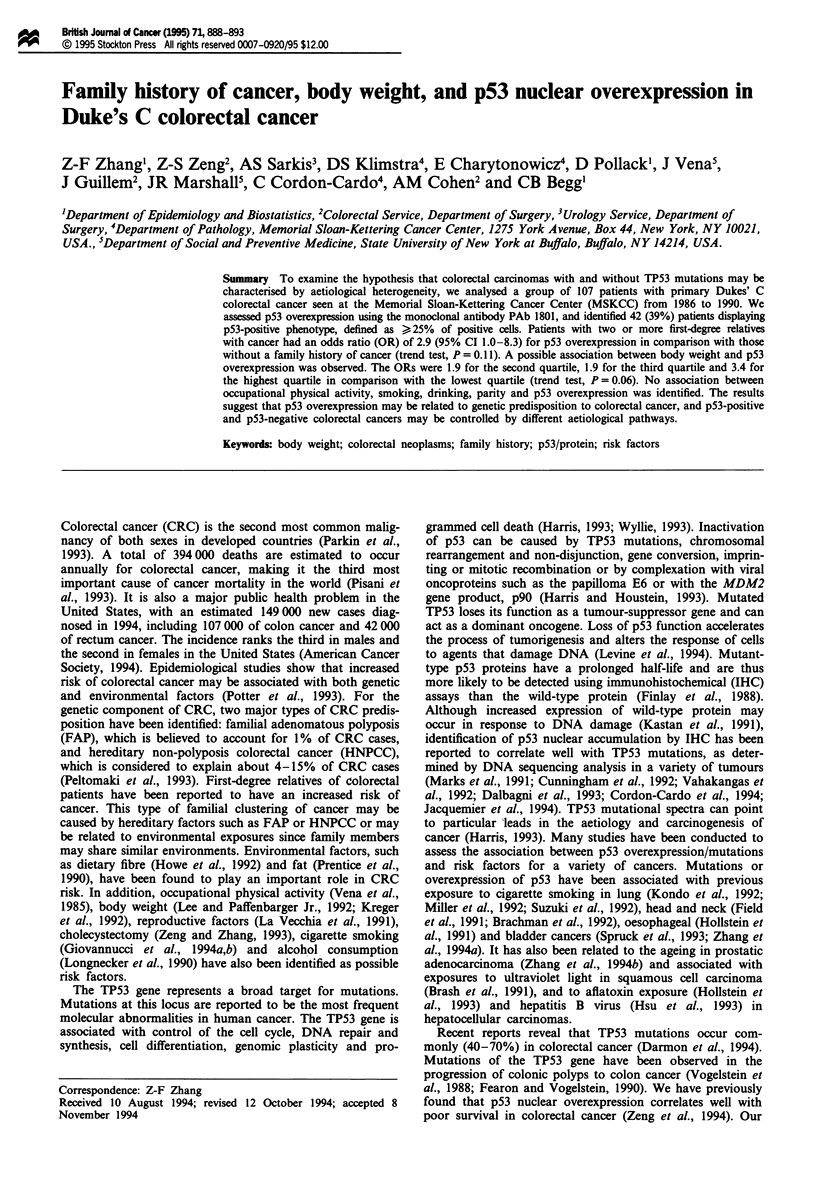
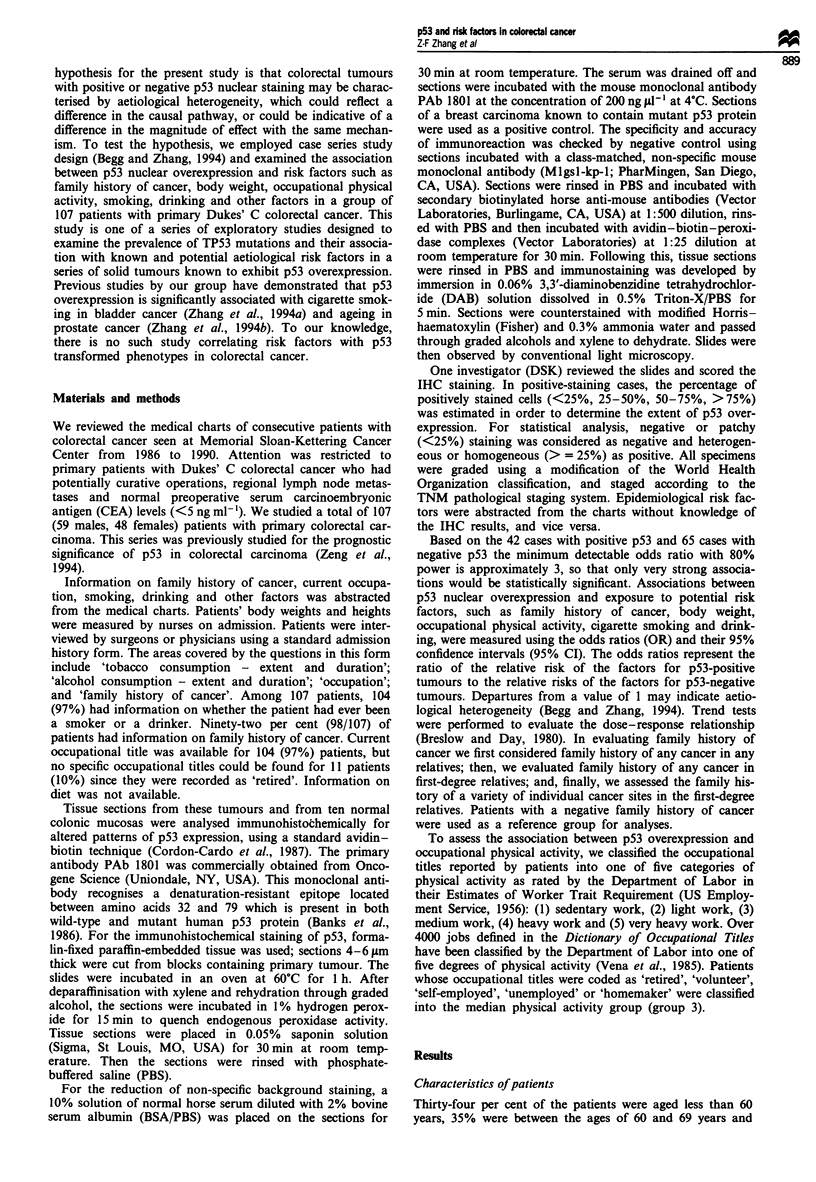
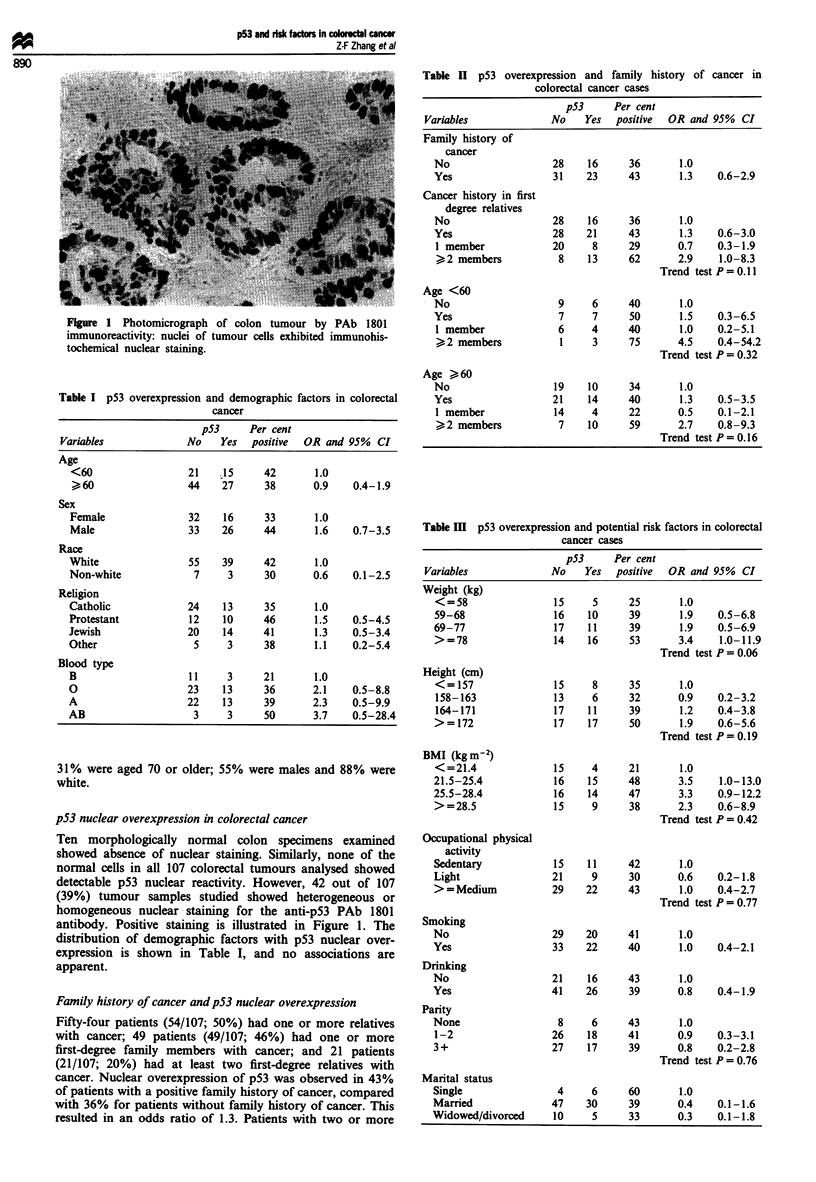
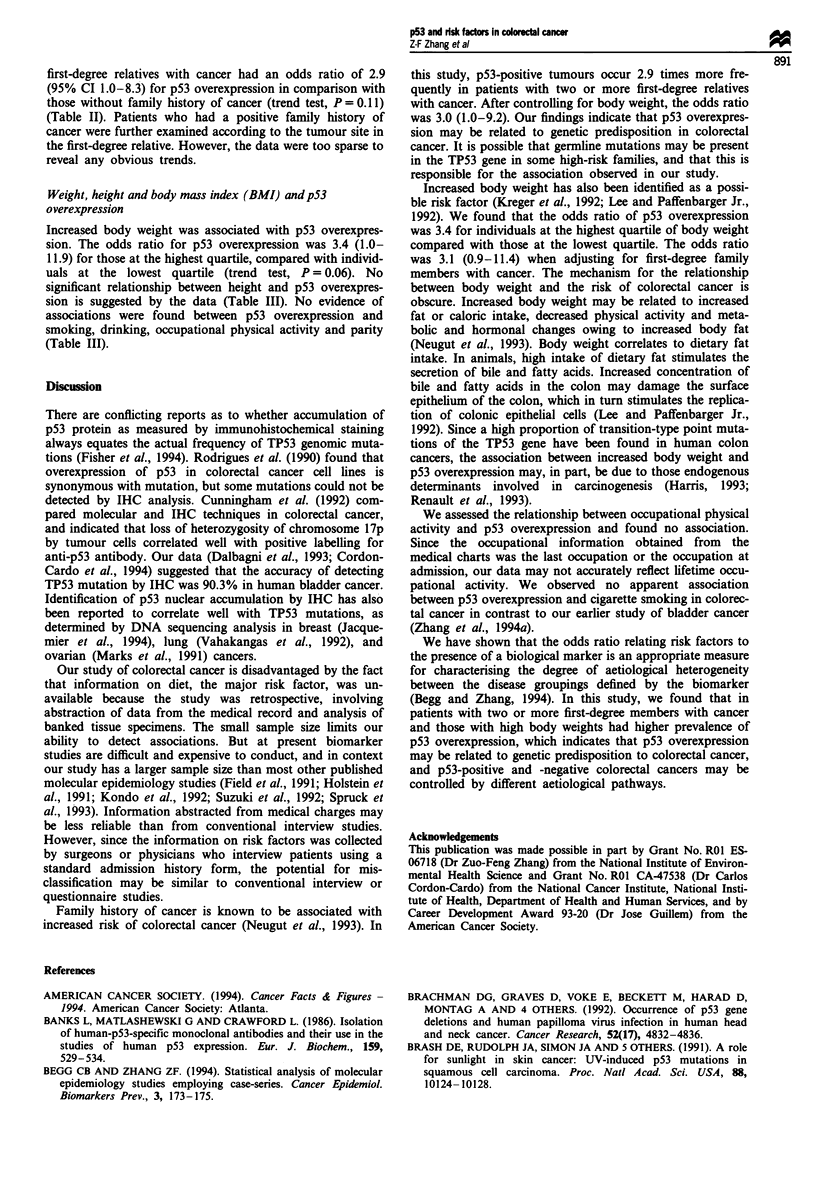
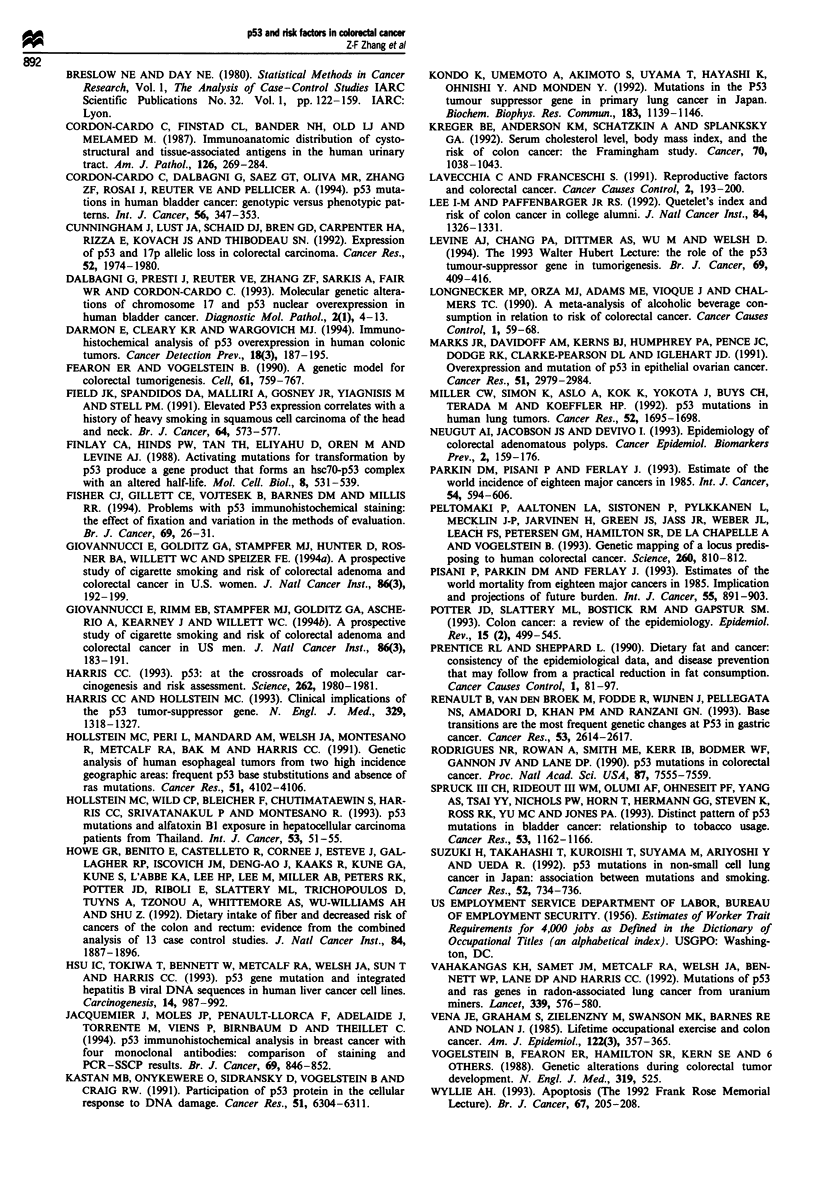

Images in this article
Selected References
These references are in PubMed. This may not be the complete list of references from this article.
- Aaltonen L. A., Peltomäki P., Leach F. S., Sistonen P., Pylkkänen L., Mecklin J. P., Järvinen H., Powell S. M., Jen J., Hamilton S. R. Clues to the pathogenesis of familial colorectal cancer. Science. 1993 May 7;260(5109):812–816. doi: 10.1126/science.8484121. [DOI] [PubMed] [Google Scholar]
- Banks L., Matlashewski G., Crawford L. Isolation of human-p53-specific monoclonal antibodies and their use in the studies of human p53 expression. Eur J Biochem. 1986 Sep 15;159(3):529–534. doi: 10.1111/j.1432-1033.1986.tb09919.x. [DOI] [PubMed] [Google Scholar]
- Begg C. B., Zhang Z. F. Statistical analysis of molecular epidemiology studies employing case-series. Cancer Epidemiol Biomarkers Prev. 1994 Mar;3(2):173–175. [PubMed] [Google Scholar]
- Brachman D. G., Graves D., Vokes E., Beckett M., Haraf D., Montag A., Dunphy E., Mick R., Yandell D., Weichselbaum R. R. Occurrence of p53 gene deletions and human papilloma virus infection in human head and neck cancer. Cancer Res. 1992 Sep 1;52(17):4832–4836. [PubMed] [Google Scholar]
- Brash D. E., Rudolph J. A., Simon J. A., Lin A., McKenna G. J., Baden H. P., Halperin A. J., Pontén J. A role for sunlight in skin cancer: UV-induced p53 mutations in squamous cell carcinoma. Proc Natl Acad Sci U S A. 1991 Nov 15;88(22):10124–10128. doi: 10.1073/pnas.88.22.10124. [DOI] [PMC free article] [PubMed] [Google Scholar]
- Cordon-Cardo C., Dalbagni G., Saez G. T., Oliva M. R., Zhang Z. F., Rosai J., Reuter V. E., Pellicer A. p53 mutations in human bladder cancer: genotypic versus phenotypic patterns. Int J Cancer. 1994 Feb 1;56(3):347–353. doi: 10.1002/ijc.2910560309. [DOI] [PubMed] [Google Scholar]
- Cordon-Cardo C., Finstad C. L., Bander N. H., Melamed M. R. Immunoanatomic distribution of cytostructural and tissue-associated antigens in the human urinary tract. Am J Pathol. 1987 Feb;126(2):269–284. [PMC free article] [PubMed] [Google Scholar]
- Cunningham J., Lust J. A., Schaid D. J., Bren G. D., Carpenter H. A., Rizza E., Kovach J. S., Thibodeau S. N. Expression of p53 and 17p allelic loss in colorectal carcinoma. Cancer Res. 1992 Apr 1;52(7):1974–1980. [PubMed] [Google Scholar]
- Dalbagni G., Presti J. C., Jr, Reuter V. E., Zhang Z. F., Sarkis A. S., Fair W. R., Cordon-Cardo C. Molecular genetic alterations of chromosome 17 and p53 nuclear overexpression in human bladder cancer. Diagn Mol Pathol. 1993 Mar;2(1):4–13. [PubMed] [Google Scholar]
- Darmon E., Cleary K. R., Wargovich M. J. Immunohistochemical analysis of p53 overexpression in human colonic tumors. Cancer Detect Prev. 1994;18(3):187–195. [PubMed] [Google Scholar]
- Fearon E. R., Vogelstein B. A genetic model for colorectal tumorigenesis. Cell. 1990 Jun 1;61(5):759–767. doi: 10.1016/0092-8674(90)90186-i. [DOI] [PubMed] [Google Scholar]
- Field J. K., Spandidos D. A., Malliri A., Gosney J. R., Yiagnisis M., Stell P. M. Elevated P53 expression correlates with a history of heavy smoking in squamous cell carcinoma of the head and neck. Br J Cancer. 1991 Sep;64(3):573–577. doi: 10.1038/bjc.1991.352. [DOI] [PMC free article] [PubMed] [Google Scholar]
- Finlay C. A., Hinds P. W., Tan T. H., Eliyahu D., Oren M., Levine A. J. Activating mutations for transformation by p53 produce a gene product that forms an hsc70-p53 complex with an altered half-life. Mol Cell Biol. 1988 Feb;8(2):531–539. doi: 10.1128/mcb.8.2.531. [DOI] [PMC free article] [PubMed] [Google Scholar]
- Fisher C. J., Gillett C. E., Vojtesek B., Barnes D. M., Millis R. R. Problems with p53 immunohistochemical staining: the effect of fixation and variation in the methods of evaluation. Br J Cancer. 1994 Jan;69(1):26–31. doi: 10.1038/bjc.1994.4. [DOI] [PMC free article] [PubMed] [Google Scholar]
- Giovannucci E., Rimm E. B., Stampfer M. J., Colditz G. A., Ascherio A., Kearney J., Willett W. C. A prospective study of cigarette smoking and risk of colorectal adenoma and colorectal cancer in U.S. men. J Natl Cancer Inst. 1994 Feb 2;86(3):183–191. doi: 10.1093/jnci/86.3.183. [DOI] [PubMed] [Google Scholar]
- Harris C. C., Hollstein M. Clinical implications of the p53 tumor-suppressor gene. N Engl J Med. 1993 Oct 28;329(18):1318–1327. doi: 10.1056/NEJM199310283291807. [DOI] [PubMed] [Google Scholar]
- Harris C. C. p53: at the crossroads of molecular carcinogenesis and risk assessment. Science. 1993 Dec 24;262(5142):1980–1981. doi: 10.1126/science.8266092. [DOI] [PubMed] [Google Scholar]
- Hollstein M. C., Peri L., Mandard A. M., Welsh J. A., Montesano R., Metcalf R. A., Bak M., Harris C. C. Genetic analysis of human esophageal tumors from two high incidence geographic areas: frequent p53 base substitutions and absence of ras mutations. Cancer Res. 1991 Aug 1;51(15):4102–4106. [PubMed] [Google Scholar]
- Hollstein M. C., Wild C. P., Bleicher F., Chutimataewin S., Harris C. C., Srivatanakul P., Montesano R. p53 mutations and aflatoxin B1 exposure in hepatocellular carcinoma patients from Thailand. Int J Cancer. 1993 Jan 2;53(1):51–55. doi: 10.1002/ijc.2910530111. [DOI] [PubMed] [Google Scholar]
- Hsu I. C., Tokiwa T., Bennett W., Metcalf R. A., Welsh J. A., Sun T., Harris C. C. p53 gene mutation and integrated hepatitis B viral DNA sequences in human liver cancer cell lines. Carcinogenesis. 1993 May;14(5):987–992. doi: 10.1093/carcin/14.5.987. [DOI] [PubMed] [Google Scholar]
- Jacquemier J., Molès J. P., Penault-Llorca F., Adélaide J., Torrente M., Viens P., Birnbaum D., Theillet C. p53 immunohistochemical analysis in breast cancer with four monoclonal antibodies: comparison of staining and PCR-SSCP results. Br J Cancer. 1994 May;69(5):846–852. doi: 10.1038/bjc.1994.164. [DOI] [PMC free article] [PubMed] [Google Scholar]
- Kastan M. B., Onyekwere O., Sidransky D., Vogelstein B., Craig R. W. Participation of p53 protein in the cellular response to DNA damage. Cancer Res. 1991 Dec 1;51(23 Pt 1):6304–6311. [PubMed] [Google Scholar]
- Kondo K., Umemoto A., Akimoto S., Uyama T., Hayashi K., Ohnishi Y., Monden Y. Mutations in the P53 tumour suppressor gene in primary lung cancer in Japan. Biochem Biophys Res Commun. 1992 Mar 31;183(3):1139–1146. doi: 10.1016/s0006-291x(05)80309-2. [DOI] [PubMed] [Google Scholar]
- Kreger B. E., Anderson K. M., Schatzkin A., Splansky G. L. Serum cholesterol level, body mass index, and the risk of colon cancer. The Framingham Study. Cancer. 1992 Sep 1;70(5):1038–1043. doi: 10.1002/1097-0142(19920901)70:5<1038::aid-cncr2820700505>3.0.co;2-m. [DOI] [PubMed] [Google Scholar]
- La Vecchia C., Franceschi S. Reproductive factors and colorectal cancer. Cancer Causes Control. 1991 May;2(3):193–200. doi: 10.1007/BF00056213. [DOI] [PubMed] [Google Scholar]
- Lee I. M., Paffenbarger R. S., Jr Quetelet's index and risk of colon cancer in college alumni. J Natl Cancer Inst. 1992 Sep 2;84(17):1326–1331. doi: 10.1093/jnci/84.17.1326. [DOI] [PubMed] [Google Scholar]
- Levine A. J., Perry M. E., Chang A., Silver A., Dittmer D., Wu M., Welsh D. The 1993 Walter Hubert Lecture: the role of the p53 tumour-suppressor gene in tumorigenesis. Br J Cancer. 1994 Mar;69(3):409–416. doi: 10.1038/bjc.1994.76. [DOI] [PMC free article] [PubMed] [Google Scholar]
- Longnecker M. P., Orza M. J., Adams M. E., Vioque J., Chalmers T. C. A meta-analysis of alcoholic beverage consumption in relation to risk of colorectal cancer. Cancer Causes Control. 1990 Jul;1(1):59–68. doi: 10.1007/BF00053184. [DOI] [PubMed] [Google Scholar]
- Marks J. R., Davidoff A. M., Kerns B. J., Humphrey P. A., Pence J. C., Dodge R. K., Clarke-Pearson D. L., Iglehart J. D., Bast R. C., Jr, Berchuck A. Overexpression and mutation of p53 in epithelial ovarian cancer. Cancer Res. 1991 Jun 1;51(11):2979–2984. [PubMed] [Google Scholar]
- Miller C. W., Simon K., Aslo A., Kok K., Yokota J., Buys C. H., Terada M., Koeffler H. P. p53 mutations in human lung tumors. Cancer Res. 1992 Apr 1;52(7):1695–1698. [PubMed] [Google Scholar]
- Neugut A. I., Jacobson J. S., De Vivo I. Epidemiology of colorectal adenomatous polyps. Cancer Epidemiol Biomarkers Prev. 1993 Mar-Apr;2(2):159–176. [PubMed] [Google Scholar]
- Parkin D. M., Pisani P., Ferlay J. Estimates of the worldwide incidence of eighteen major cancers in 1985. Int J Cancer. 1993 Jun 19;54(4):594–606. doi: 10.1002/ijc.2910540413. [DOI] [PubMed] [Google Scholar]
- Peltomäki P., Aaltonen L. A., Sistonen P., Pylkkänen L., Mecklin J. P., Järvinen H., Green J. S., Jass J. R., Weber J. L., Leach F. S. Genetic mapping of a locus predisposing to human colorectal cancer. Science. 1993 May 7;260(5109):810–812. doi: 10.1126/science.8484120. [DOI] [PubMed] [Google Scholar]
- Pisani P., Parkin D. M., Ferlay J. Estimates of the worldwide mortality from eighteen major cancers in 1985. Implications for prevention and projections of future burden. Int J Cancer. 1993 Dec 2;55(6):891–903. doi: 10.1002/ijc.2910550604. [DOI] [PubMed] [Google Scholar]
- Potter J. D., Slattery M. L., Bostick R. M., Gapstur S. M. Colon cancer: a review of the epidemiology. Epidemiol Rev. 1993;15(2):499–545. doi: 10.1093/oxfordjournals.epirev.a036132. [DOI] [PubMed] [Google Scholar]
- Renault B., van den Broek M., Fodde R., Wijnen J., Pellegata N. S., Amadori D., Khan P. M., Ranzani G. N. Base transitions are the most frequent genetic changes at P53 in gastric cancer. Cancer Res. 1993 Jun 1;53(11):2614–2617. [PubMed] [Google Scholar]
- Rodrigues N. R., Rowan A., Smith M. E., Kerr I. B., Bodmer W. F., Gannon J. V., Lane D. P. p53 mutations in colorectal cancer. Proc Natl Acad Sci U S A. 1990 Oct;87(19):7555–7559. doi: 10.1073/pnas.87.19.7555. [DOI] [PMC free article] [PubMed] [Google Scholar]
- Spruck C. H., 3rd, Rideout W. M., 3rd, Olumi A. F., Ohneseit P. F., Yang A. S., Tsai Y. C., Nichols P. W., Horn T., Hermann G. G., Steven K. Distinct pattern of p53 mutations in bladder cancer: relationship to tobacco usage. Cancer Res. 1993 Mar 1;53(5):1162–1166. [PubMed] [Google Scholar]
- Suzuki H., Takahashi T., Kuroishi T., Suyama M., Ariyoshi Y., Takahashi T., Ueda R. p53 mutations in non-small cell lung cancer in Japan: association between mutations and smoking. Cancer Res. 1992 Feb 1;52(3):734–736. [PubMed] [Google Scholar]
- Vena J. E., Graham S., Zielezny M., Swanson M. K., Barnes R. E., Nolan J. Lifetime occupational exercise and colon cancer. Am J Epidemiol. 1985 Sep;122(3):357–365. doi: 10.1093/oxfordjournals.aje.a114116. [DOI] [PubMed] [Google Scholar]
- Vogelstein B., Fearon E. R., Hamilton S. R., Kern S. E., Preisinger A. C., Leppert M., Nakamura Y., White R., Smits A. M., Bos J. L. Genetic alterations during colorectal-tumor development. N Engl J Med. 1988 Sep 1;319(9):525–532. doi: 10.1056/NEJM198809013190901. [DOI] [PubMed] [Google Scholar]
- Vähäkangas K. H., Samet J. M., Metcalf R. A., Welsh J. A., Bennett W. P., Lane D. P., Harris C. C. Mutations of p53 and ras genes in radon-associated lung cancer from uranium miners. Lancet. 1992 Mar 7;339(8793):576–580. doi: 10.1016/0140-6736(92)90866-2. [DOI] [PubMed] [Google Scholar]
- Wyllie A. H. Apoptosis (the 1992 Frank Rose Memorial Lecture). Br J Cancer. 1993 Feb;67(2):205–208. doi: 10.1038/bjc.1993.40. [DOI] [PMC free article] [PubMed] [Google Scholar]
- Zeng Z. S., Sarkis A. S., Zhang Z. F., Klimstra D. S., Charytonowicz E., Guillem J. G., Cordon-Cardo C., Cohen A. M. p53 nuclear overexpression: an independent predictor of survival in lymph node--positive colorectal cancer patients. J Clin Oncol. 1994 Oct;12(10):2043–2050. doi: 10.1200/JCO.1994.12.10.2043. [DOI] [PubMed] [Google Scholar]
- Zeng Z. S., Zhang Z. F. Cholecystectomy and colorectal cancer in China. Surg Oncol. 1993 Dec;2(6):311–319. doi: 10.1016/0960-7404(93)90061-3. [DOI] [PubMed] [Google Scholar]
- Zhang Z. F., Sarkis A. S., Cordon-Cardo C., Dalbagni G., Melamed J., Aprikian A., Pollack D., Sheinfeld J., Herr H. W., Fair W. R. Tobacco smoking, occupation, and p53 nuclear overexpression in early stage bladder cancer. Cancer Epidemiol Biomarkers Prev. 1994 Jan-Feb;3(1):19–24. [PubMed] [Google Scholar]



